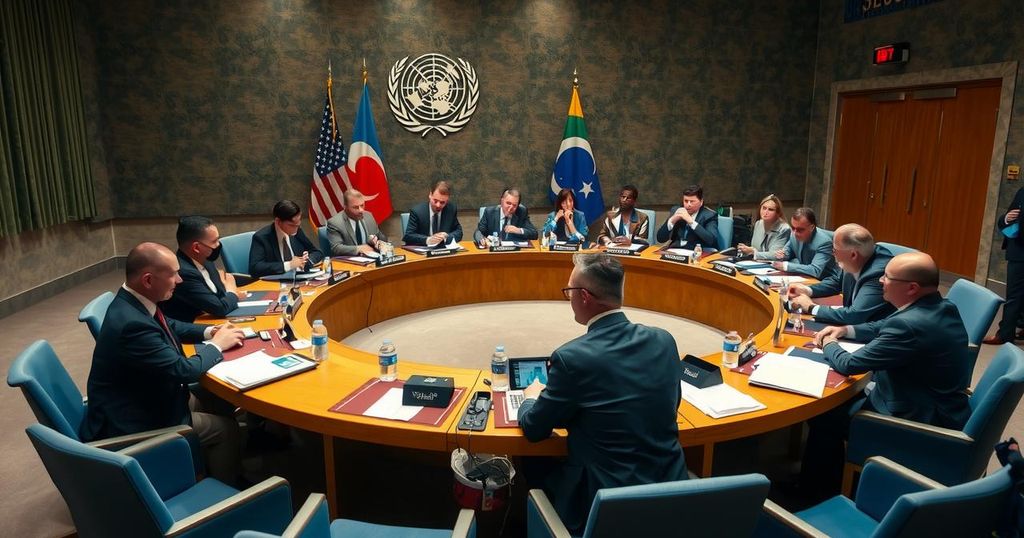The U.N. Security Council will hold an emergency meeting to discuss Israel’s military actions against Iran, requested by Iran and supported by Algeria, China, and Russia. The conflict escalated after Hamas’s attack on Israel, leading to significant casualties. Iraqi protests against Israeli airspace violations also add to the tensions, while Egypt proposes a ceasefire in the Israel-Hamas conflict.
The United Nations Security Council will convene for an urgent meeting on Monday to examine the escalating tensions in the Middle East following Israel’s recent military actions against Iran. This meeting was initiated by a request from Iran, with the backing of Algeria, China, and Russia, as expressed by the president of the Council, representing Switzerland. In a communication to the 15-member Council, Iran’s Foreign Minister, Abbas Araqchi, condemned Israel’s military actions, stating that they pose a “grave threat to international peace and security” and exacerbate the already unstable situation in the region. The Israeli strikes, characterized by multiple aerial assaults targeting Iranian missile facilities, were conducted early Saturday, just weeks after Iran launched approximately 200 ballistic missiles towards Israel amidst ongoing conflicts involving Iranian-supported groups, Hamas and Hezbollah. Ayatollah Ali Khamenei, Iran’s Supreme Leader, commented on the Israeli strikes, suggesting that their significance should neither be overstated nor trivialized, though he stopped short of advocating for immediate retaliatory measures. This incident marks Israel’s first overt military action against Iran, its long-standing adversary. Israeli Prime Minister Benjamin Netanyahu remarked that the operation had effectively achieved its objectives by undermining Iran’s defense capabilities and missile production capabilities. Prior to the U.N. meeting, Iraq lodged a formal complaint concerning Israel’s utilization of Iraqi airspace for these strikes. An Iraqi government representative condemned this violation of sovereignty in their communication to the U.N. Concurrently, Israeli military forces conducted additional airstrikes in southern Lebanon, reportedly resulting in the fatalities of at least five individuals in the city of Tyre. In response to escalating tensions, Egyptian President Abdel-Fattah el-Sissi has proposed a two-day ceasefire in the ongoing Israel-Hamas conflict in Gaza. This proposal includes provisions for the release of hostages by Hamas during the ceasefire. President el-Sissi’s initiative, aimed at alleviating humanitarian concerns within Gaza, has yet to receive a response from either Israel or Hamas. As part of international diplomatic efforts, Israel’s Mossad chief, David Barnea, visited Doha for discussions with Qatari Prime Minister Mohammed bin Abdulrahman Al Thani and U.S. CIA chief William Burns. This initiative reflects ongoing efforts to mediate the current crisis, which has seen a significant death toll and ongoing strife. Recent conflict escalations began with a deadly attack by Hamas on October 7, which resulted in the deaths of 1,200 individuals and the abduction of around 250 hostages. Israel asserts that at least 101 hostages are still being held by Hamas, with 35 of them reportedly deceased. According to health officials in Gaza, the counteroffensive by Israel has led to nearly 43,000 Palestinian casualties, with the health ministry unable to differentiate between combatants and civilians in its reporting.
The recent developments in the Middle East, particularly with the military engagement between Israel and Iran, stem from a long-standing geopolitical conflict. Israel has consistently viewed Iran as a primary threat, particularly due to Iran’s support for militant groups such as Hezbollah and Hamas. The hostilities have escalated following Hamas’ attack on Israel in October 2023, which triggered a strong Israeli military response. This situation has drawn significant international attention, prompting the United Nations Security Council to address the potential ramifications for regional stability and international peace.
The upcoming emergency meeting of the U.N. Security Council underscores the urgent need for dialogue and diplomatic efforts to mitigate the conflict arising from Israel’s military actions against Iran. As countries like Iraq express concern over violations of sovereignty and Egypt proposes potential ceasefire measures, the situation remains precarious. The continuing violence, with significant casualties on both sides, highlights the need for international intervention and a reaffirmation of commitment towards achieving lasting peace in the region.
Original Source: www.voanews.com







